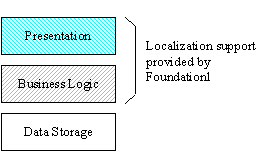
IFS Translation Manager tool is used to localize the user interface. The localization of business logic is done the application modules
Naturally, Foundation1 can not support the localization of business logic in e.g. a Payroll application. However it can, and does, support the localization of the user interface. When saying this it is important to realize that the business logic itself (e.g. tax rules) is not the same as the business logic layer in the OLA model. For convenience and technical reasons, the OLA business logic layer in addition to business logic also contains some user interface elements such as error messages.
The OLA architecture defines the three application architecture layers presentation, business logic and data storage. Of these, Foundation1 provides support (through the OS, DBMS, IFS Client Developer, or IFS Translation Manager) for the presentation and business logic layers.
Note: Although Foundation1 does not support localization of the business logic itself (such localization must and should be done in individual applications), it supports localization of user interface elements in the business logic layer.

Applications contain data that is locale-sensitive. The following are all examples of locale-sensitive data:
Currently, Foundation1 based applications are developed using two programming languages, Oracle PL/SQL and IFS Client Developer SAL (Scalable Application Language). Foundation1 supports localization of the above types of locale dependent data in these two programming languages according to the table below.
| Type of Data | Oracle PL/SQL | IFS Client Developer SAL |
|---|---|---|
| Texts and labels for GUI elements | N/A | IFS Translation Manager |
| Layout of GUI elements | N/A | IFS Client Developer |
| Date and time displays | Native Oracle DBMS functionality | Native Microsoft Windows functionality |
| Numbers, including percentages and money | Native Oracle DBMS functionality | Native Microsoft Windows functionality |
| Errors and other messages | IFS/Localization | IFS Translation Manager |
| Sounds | N/A | File replacement |
| Images | N/A | File replacement |
As is seen from the table, IFS/Localization is used solely to localize (translate) textual data. The other types of locale-dependent data are either handled by native OS or DBMS functionality, or by IFS Client Developer.
Foundation1 builds on best-practice also when it comes to localization. Therefore IFS Translation Manager only covers the aspects of localization where available support is low or unsatisfactory, where best-practice is a custom-built tool. IFS Translation Manager tool is further described in the Development Guide about the IFS Translation Manager.